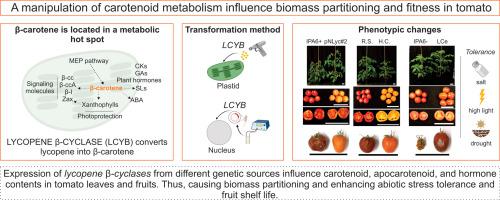Metabolic Engineering ( IF 6.8 ) Pub Date : 2022-01-11 , DOI: 10.1016/j.ymben.2022.01.004 Jianing Mi 1 , Jose G Vallarino 2 , Ivan Petřík 3 , Ondřej Novák 3 , Sandra M Correa 2 , Monika Chodasiewicz 4 , Michel Havaux 5 , Manuel Rodriguez-Concepcion 6 , Salim Al-Babili 1 , Alisdair R Fernie 2 , Aleksandra Skirycz 7 , Juan C Moreno 4

|
Improving yield, nutritional value and tolerance to abiotic stress are major targets of current breeding and biotechnological approaches that aim at increasing crop production and ensuring food security. Metabolic engineering of carotenoids, the precursor of vitamin-A and plant hormones that regulate plant growth and response to adverse growth conditions, has been mainly focusing on provitamin A biofortification or the production of high-value carotenoids. Here, we show that the introduction of a single gene of the carotenoid biosynthetic pathway in different tomato cultivars induced profound metabolic alterations in carotenoid, apocarotenoid and phytohormones pathways. Alterations in isoprenoid- (abscisic acid, gibberellins, cytokinins) and non-isoprenoid (auxin and jasmonic acid) derived hormones together with enhanced xanthophyll content influenced biomass partitioning and abiotic stress tolerance (high light, salt, and drought), and it caused an up to 77% fruit yield increase and enhanced fruit's provitamin A content. In addition, metabolic and hormonal changes led to accumulation of key primary metabolites (e.g. osmoprotectants and antiaging agents) contributing with enhanced abiotic stress tolerance and fruit shelf life. Our findings pave the way for developing a new generation of crops that combine high productivity and increased nutritional value with the capability to cope with climate change-related environmental challenges.
中文翻译:

类胡萝卜素代谢的调控影响番茄的生物量分配和适应性
提高产量、营养价值和对非生物胁迫的耐受性是当前旨在增加作物产量和确保粮食安全的育种和生物技术方法的主要目标。类胡萝卜素的代谢工程是维生素 A 和植物激素的前体,可调节植物生长和对不利生长条件的反应,主要集中在维生素 A 原生物强化或高价值类胡萝卜素的生产上。在这里,我们表明在不同番茄品种中引入类胡萝卜素生物合成途径的单个基因会引起类胡萝卜素、类胡萝卜素和植物激素途径的深刻代谢改变。类异戊二烯(脱落酸、赤霉素、细胞分裂素)和非类异戊二烯(生长素和茉莉酸)衍生激素以及叶黄素含量的增加影响了生物量分配和非生物胁迫耐受性(高光、盐和干旱),它导致高达 77% 的果实产量增加并增强了果实的维生素原A含量。此外,代谢和激素变化导致关键初级代谢物(例如渗透保护剂和抗衰老剂)的积累,有助于提高非生物胁迫耐受性和水果保质期。我们的研究结果为开发新一代作物铺平了道路,这些作物结合了高生产力和增加营养价值以及应对气候变化相关环境挑战的能力。可提高果实产量达77%,提高果实维生素A含量。此外,代谢和激素变化导致关键初级代谢物(例如渗透保护剂和抗衰老剂)的积累,有助于提高非生物胁迫耐受性和水果保质期。我们的研究结果为开发新一代作物铺平了道路,这些作物结合了高生产力和更高的营养价值以及应对气候变化相关环境挑战的能力。可提高果实产量达77%,提高果实维生素A含量。此外,代谢和激素变化导致关键初级代谢物(例如渗透保护剂和抗衰老剂)的积累,有助于提高非生物胁迫耐受性和水果保质期。我们的研究结果为开发新一代作物铺平了道路,这些作物结合了高生产力和增加营养价值以及应对气候变化相关环境挑战的能力。











































 京公网安备 11010802027423号
京公网安备 11010802027423号